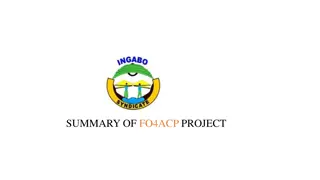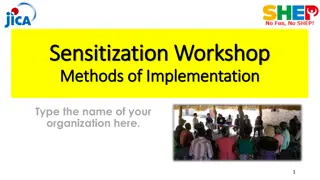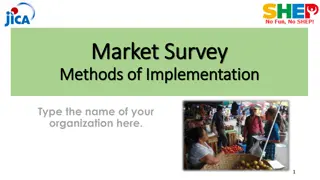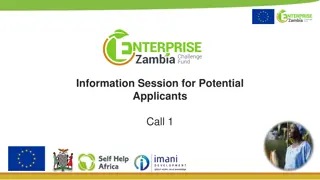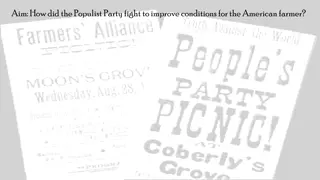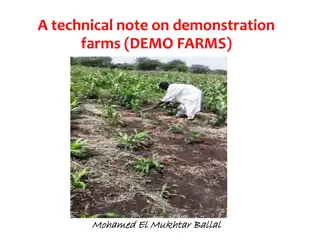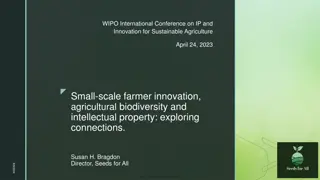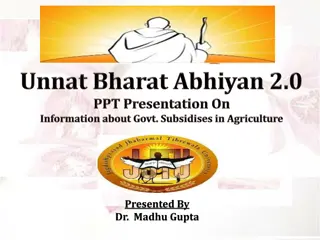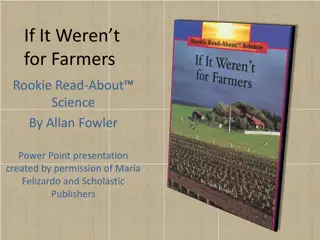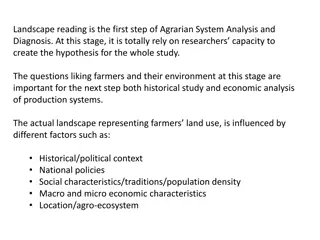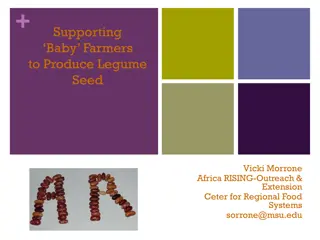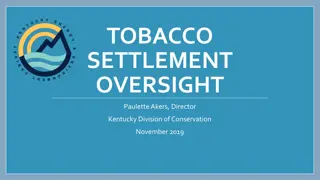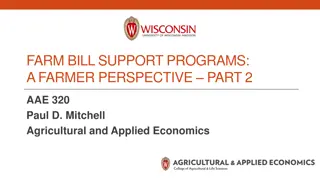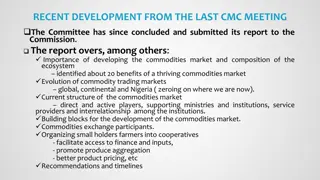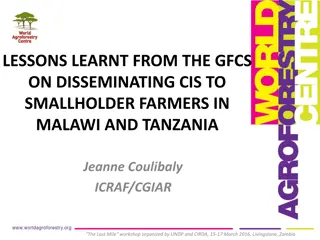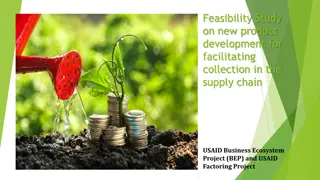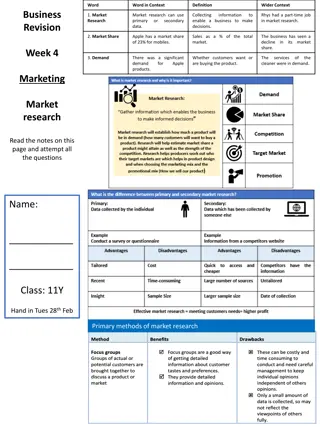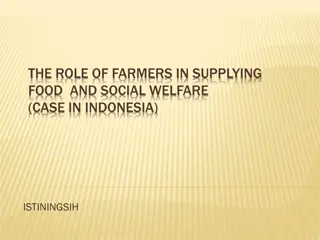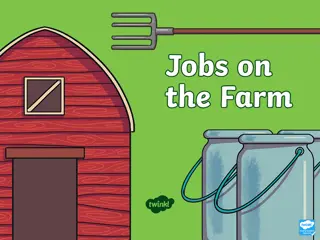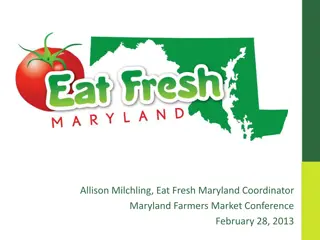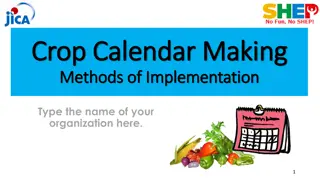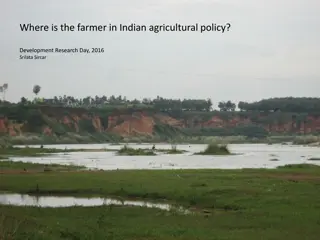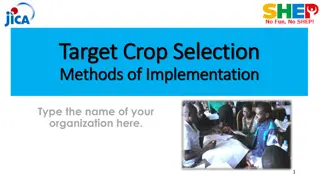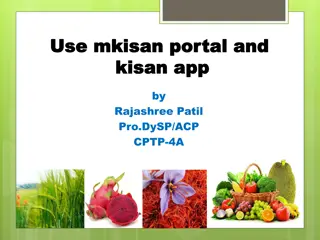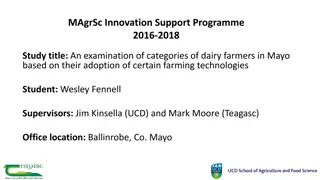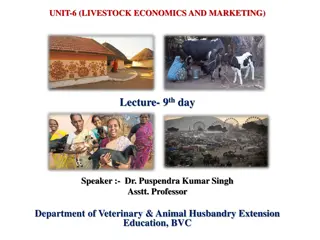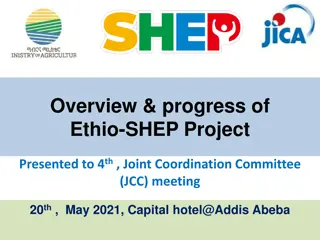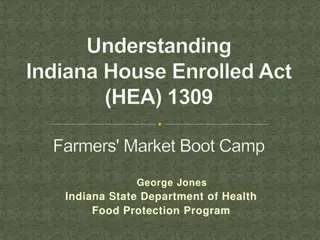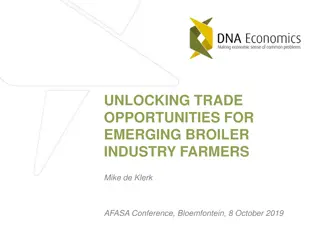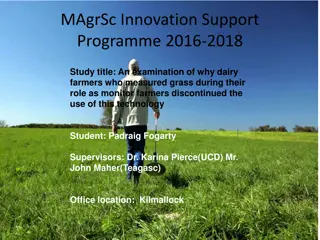Office of Partnerships and Public Engagement Overview
The Office of Partnerships and Public Engagement, led by Dr. Lisa R. Ramírez, focuses on developing partnerships to address challenges in rural and underserved communities in the U.S. It connects communities with resources from the U.S. Department of Agriculture to promote solutions and provide sup
2 views • 17 slides
Enhancing Livelihoods through FO4ACP Programme
Farmers Organizations for Africa, Caribbean and Pacific (FO4ACP) aims to uplift smallholders and family farmers in various countries by strengthening regional, national, and local farmers organizations. The program components include economic service provision, capacity building, policy influence, a
0 views • 11 slides
Understanding Credit Analysis for Farmers and Fishers
Credit analysis is crucial for farmers and fishers to access the right amount of credit at the right time. Economic feasibility tests such as returns on investment, repayment capacity, and risk-bearing ability are essential factors to evaluate credit worthiness. The 3Rs of credit - returns, repaymen
0 views • 30 slides
Implementing Sensitization Workshops for Agricultural Development
This content provides a detailed guide on conducting Sensitization Workshops for agricultural development, focusing on steps, objectives, and implementation methods. The workshops aim to raise awareness, empower farmers, and enhance skills for self-reliance. Key aspects covered include sharing goals
0 views • 13 slides
Empowering Farmers Through Market Surveys
The market survey methodology outlined in the content focuses on empowering farmers by increasing their understanding of market dynamics, building relationships with market players, and enhancing decision-making skills. It involves structured steps like sensitization workshops, crop selection, and i
1 views • 23 slides
Enterprise Zambia Challenge Fund - Supporting Sustainable Agriculture
Enterprise Zambia Challenge Fund, implemented by Self Help Africa with support from the European Union and the Government of Zambia, aims to integrate smallholder farmers into sustainable value chains in Zambia. The project provides economic, nutrition, and technical support to agri-enterprises, wit
0 views • 51 slides
The Populist Party's Fight for American Farmers
The Populist Party emerged as a champion for American farmers who were facing economic hardships such as low crop prices, increasing debt, and unfair railroad charges. Through the Grange organization, farmers demanded reforms like regulating railroads, implementing bimetallism, and advocating for po
1 views • 11 slides
Contract Farming in India: A Case Study of Potato Cultivation
Value addition in Indian agriculture is low due to poor processing levels. Contract farming is being considered to integrate agriculture production into the global value chain, but concerns about unequal bargaining power between farmers and corporations exist. Various forms of contract farming exist
0 views • 26 slides
Understanding Demonstration Farms and Their Objectives
Demonstration farms (DEMO farms) play a crucial role in showcasing improved agricultural practices to farmers. These farms are used to educate, share ideas, and demonstrate the benefits of new crop varieties and techniques. By promoting the use of innovative methods, DEMO farms aim to increase farme
1 views • 13 slides
Small-Scale Farmer Innovation and Agricultural Biodiversity in the Context of Intellectual Property
Discussions at the WIPO International Conference on IP and Innovation for Sustainable Agriculture highlighted the crucial role of small-scale farmers in managing and developing agricultural biodiversity, which is essential for sustainable agricultural production and global food security. The session
1 views • 12 slides
Overview of Agricultural Subsidies in India
Government in India provides various subsidies to farmers, including fertilizer, power, irrigation, seed, export, credit, and agricultural infrastructure subsidies. The subsidies aim to support farmers with affordable inputs, stable prices, and adequate availability. The current subsidy bill is subs
0 views • 13 slides
Supporting Agricultural Cooperatives Development Project
This European Union-funded project, implemented by CARE and MEDF, aims to enhance productivity and competitiveness in the agricultural sector by fostering cooperation and market competitiveness among farmers through the establishment and growth of agricultural cooperatives. Key activities include re
0 views • 11 slides
The Importance of Farmers in Our Food Supply Chain
Farmers play a crucial role in our food production, providing us with fruits, vegetables, dairy products, meat, eggs, grains, and more. They work tirelessly to grow crops, raise animals, and ensure a stable food supply for all. Different crops thrive in varying climates, from citrus fruits in warm r
1 views • 26 slides
Understanding Landscape in Agrarian System Analysis
Landscape reading is the initial step in Agrarian System Analysis where researchers form hypotheses based on farmers' interactions with their environment. Factors like historical context, policies, and socio-economic conditions influence farmers' land use. Zoning the landscape helps explain agricult
1 views • 4 slides
Supporting Baby Farmers in Legume Seed Production
This project, led by Vicki Morrone from Africa RISING-Outreach & Extension Center for Regional Food Systems, focuses on supporting small-scale farmers in producing legume seeds. The initiative aims to enhance agricultural practices among farmers to boost legume seed production. The project outlines
0 views • 4 slides
Interactive Nutrition Education at Cooking Matters Farmers Market Tour
Cooking Matters at the Farmers Market offers interactive nutrition education combined with practical tips on budget-friendly, healthy shopping at local markets. Participants learn to utilize EBT/SNAP benefits, maximize discounts, and identify healthier food choices. The program aims to empower indiv
0 views • 35 slides
How to Start a Farmers Market: A Step-by-Step Guide
Learn the essential steps to start a successful farmers market with insights from the West Virginia Farmers Market Association. Discover the benefits to small/medium-sized farm operators, consumers, the community, and the local economy. Follow the ten basic steps, from holding stakeholder meetings t
1 views • 16 slides
Financial Assistance Program for Farmers Overview
Financial assistance program details for farmers implementing best management practices on their farms, funded through the Tobacco Master Settlement Agreement. The program provides a 75% reimbursement rate to farmers with the help of local conservation districts. Challenges with fund allocation and
0 views • 21 slides
Understanding Marketing Assistance Loans (MAL) and Loan Deficiency Payments (LDP) for Farmers
Farmers can benefit from Marketing Assistance Loans (MAL) and Loan Deficiency Payments (LDP) to manage cash flow and ensure price floors for their harvested grain. MAL offers low-interest loans while LDP provides payments if prices fall below a certain level, offering financial support during challe
0 views • 39 slides
Recent Developments in Commodity Market Ecosystem and Global Competitiveness of Nigeria
The recent report from the last CMC meeting highlights the significance of developing the commodities market and the ecosystem's composition. It identifies multiple benefits of a thriving commodities market and discusses the evolution of commodity trading markets globally, continentally, and in Nige
0 views • 6 slides
Enhancing Climate Information Dissemination to Smallholder Farmers in Malawi and Tanzania
Lessons learned from the Global Framework for Climate Services (GFCS) on disseminating Climate Information Services (CIS) to smallholder farmers in Malawi and Tanzania highlighted the importance of multi-stakeholder partnerships in improving access to climate information. The advantages include a ho
0 views • 14 slides
Feasibility Study on New Product Development for Supply Chain Collection Enhancement
Feasibility study conducted as part of the USAID Business Ecosystem Project and USAID Factoring Project to assess the need for financial products benefiting farmers and buyers in the supply chain. Study involved leading agribusinesses and farmers in various sectors to understand payment challenges a
0 views • 16 slides
Understanding Market Research for Business Success
Market research is crucial for businesses to gather information about their target market, customer needs, competition, and market trends. Primary and secondary research methods, market share analysis, demand assessment, and calculating market size are key aspects discussed in this content. Various
1 views • 5 slides
The Essential Role of Farmers in Indonesia's Food Supply and Social Welfare
Farmers play a crucial role in supplying food to Indonesia's growing population and contributing to social welfare. This article explores the intersection of food production, population growth, and social welfare in Indonesia, emphasizing the significance of farmers in ensuring food security and soc
0 views • 30 slides
Life on the Farm: Jobs and Responsibilities of Farmers
Farmers play a crucial role in growing food and caring for animals on farms worldwide. From feeding and cleaning animals to milking cows and collecting eggs, there are various tasks involved in farm life. Farmers also look after baby animals, herd sheep, and shear wool in addition to managing crops.
0 views • 19 slides
Provide Access to Fresh Food: Eat Fresh Maryland Initiative
The Eat Fresh Maryland initiative, established in 2010, is a partnership focused on expanding federal nutrition benefits redemption at farmers markets in Maryland. With nearly 30 partners, the initiative aims to increase food access for low-income residents, boost revenue for local farmers, and prom
0 views • 10 slides
Norwegian Farmers Union: Growing Food for a Better Future
The Norwegian Farmers Union, Norges Bondelag, is dedicated to improving conditions in agriculture, securing good soil for future food production, and maintaining a robust countryside. They prioritize producing healthy food sustainably, supporting farmers' economy, and preserving cultural landscapes.
0 views • 9 slides
Empowering Farmers Through Crop Calendar Making
This guide outlines a comprehensive approach to empowering farmers through Crop Calendar Making, enabling farmer groups to plan production and marketing activities collectively. The process involves various steps such as raising awareness, decision-making, acquiring skills, and implementing annual p
0 views • 15 slides
The Role of Farmers in Indian Agricultural Policy Evolution
The historical evolution of Indian agricultural policies, from the 1950s to the present, reflects a shift in focus from infrastructural development to a technocratic approach. There has been a policy vacuum regarding the direct impact on farmers, with limited coverage of price support and increasing
0 views • 21 slides
Effective Target Crop Selection for Sustainable Farming Initiatives
Learn how to efficiently implement target crop selection in farming projects with steps such as conducting sensitization workshops, surveys, and training sessions. Farmers are empowered to make informed decisions on crop selection based on market demands, leading to collective production and marketi
0 views • 16 slides
Utilizing Mkisan Portal for Agricultural Information and Services
Mkisan portal and app, initiated by Rajashree Patil, aim to provide valuable agricultural information and services to farmers through SMS, web, and call center registrations. With a focus on enhancing rural connectivity and empowering farmers with essential knowledge, the portal offers registration
0 views • 10 slides
Analysis of Dairy Farmers' Technology Adoption in Mayo
Investigating the adoption of farming technologies by dairy farmers in Mayo, this study categorizes farmers based on adoption levels and factors influencing technology uptake. Through surveys and interviews, five categories of farmers were identified: Advanced, Progressive, Sustainable, Deliberate,
0 views • 11 slides
Livestock Economics and Marketing: Market Information and Institutional Approach
Market information plays a crucial role in livestock economics and marketing by providing essential knowledge on prices, quantities, and stocks, aiding decision-making for farmers and market intermediaries. It encompasses market news and market intelligence. The collection of market information is d
0 views • 11 slides
Ethio-SHEP Project Overview and Progress Update
The Ethio-SHEP project aims to empower smallholder farmers in Amhara and Oromia Regions through market-oriented agriculture. Implemented by a joint team, the project focuses on capacity building, income generation, and effective extension services. Utilizing a four-step approach, the project has rea
0 views • 20 slides
Understanding Indiana House Enrolled Act 1309: Farmers' Market Regulations
Indiana House Enrolled Act 1309 brings significant modifications to food establishment regulations, particularly for individual vendors at farmers' markets and roadside stands. The act allows certain food products to be sold in limited public places, impacting licensing, fees, and regulatory oversig
0 views • 28 slides
Unlocking Trade Opportunities for Emerging Broiler Industry Farmers - AFASA Conference Presentation
Mike de Klerk presented at the AFASA Conference in Bloemfontein, highlighting export opportunities and growth constraints for South African broiler industry farmers. The presentation explores main export opportunities for producers, challenges faced by small producers, and potential pathways for mar
0 views • 9 slides
Understanding Factors Influencing Dairy Farmers' Grass Measuring Technology Adoption
This study examines why dairy farmers who initially embraced grass measuring technology later discontinued its use. Through interviews and focus groups, reasons for discontinuation are compared with those who continue to use the technology. Recommendations include providing more support and resource
0 views • 9 slides
Understanding BCG Matrix: Market Growth and Relative Market Share
BCG Matrix, developed by Bruce Henderson of the Boston Consulting Group, categorizes business units into Question Marks, Stars, Cash Cows, and Dogs based on market growth and relative market share. Market share and market growth are crucial factors in determining a company's position in the market.
0 views • 31 slides
Difference Between Capital Market and Money Market: A Comprehensive Overview
The capital market and money market serve different purposes in the financial world. While the capital market provides funds for long-term investments in securities like stocks and debentures, the money market deals with short-term borrowing and lending of funds. The capital market acts as a middlem
0 views • 4 slides
Empowering Indian Farmers Through E-Choupal and ICT for Development
Revolutionizing traditional choupals into digital e-choupals, farmers access market information and improve practices through internet-enabled kiosks manned by villagers. ICT for Development (ICT4D) leverages technology to enhance international development outcomes beyond cost-effectiveness, emphasi
0 views • 8 slides

